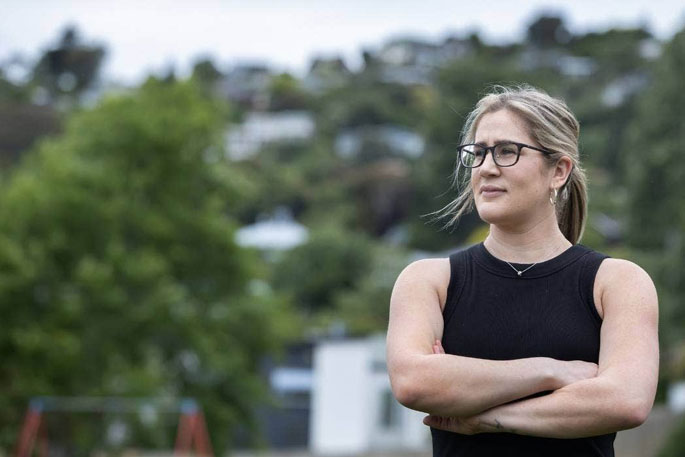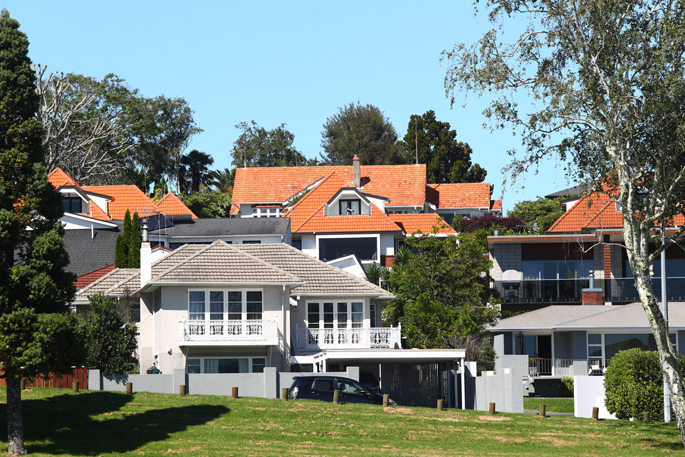Helen Murrell says she's happy she didn't take her mortgage broker's advice to fix her home loan for a year when she bought her house last year, and fixed for three instead.
At the time, she was offered a one-year rate of 2.6 per cent, a two-year rate of 2.99 per cent or a three-year option of 3.39 per cent.
'I wish I fixed for longer of course.”
She says things would be 'pretty tight” if she had taken the one-year rate and was now rolling off on to a rate of almost six per cent.
'If I was paying six per cent right now all my disposable income would be covering that gap. I'm actually just trying to live like my interest rate is high and pay down my mortgage. But once interest rates hit seven per cent, I will have to get a boarder if I want to continue to do things like let my son do swimming lessons and not eat beans and rice for dinner every night.”
She says her house, which she bought for $710,000, was estimated to have dropped in value to about $670,000.
She says not buying a place that stretched her to her maximum capacity proved a good decision.
'I will just try and ride it out and I likely can unless interest rates hit 10 per cent, then it will be a stretch.”
Interest rates are top-of-mind for many borrowers at the moment because the Reserve Bank is expected to increase the official cash rate (OCR) on Wednesday by at least 50 basis points and probably 75.
Chris Tennent-Brown, a senior economist at ASB, says that would not necessarily have an immediate impact on fixed home loan rates because many have priced in further OCR increases.
'It's going to be more about the outlook and their actions – a 75bp hike and a really aggressive outlook might get the fixed rates moving over the next few weeks, but wholesale markets and mortgage rate movements over recent weeks have factored in an OCR increase this week, and more next year.”
He expects fixed rates to peak at 'high sixes to mid-sevens” if the OCR stopped where the market expects, at about five per cent.
Christchurch woman Grace Brown says her mortgage is divided in half.
One half has already rolled off its fixed rate of 4.9 per cent to a floating rate of 7.34 per cent and was costing $150 a fortnight more. The other half will come up for refixing in December.
 Grace Brown is looking to buy a new house but says higher interest rates are getting in the way. Photo: Stuff.
Grace Brown is looking to buy a new house but says higher interest rates are getting in the way. Photo: Stuff.
'I'm fortunate enough that I'm only looking after myself at the moment, I have a fairly low mortgage so I can accommodate the extra for a while.”
She says she's deciding whether to refix the floating portion now or wait until she could potentially look for a better deal on the whole loan with another bank.
Brown says she has been thinking about buying another house and renting out her existing home but the increase in interest rates meant she was now no longer looking in the $800,000 price range, and instead in the upper end of $600,000.
”I was going to rent out my current home and move to something a bit bigger so I can have some more space but it doesn't look like I'm going to get that.”
Another woman, Hana, says she has given up on her goal of building a house, partly because of the rapid increase in interest rates.
'We have a deposit and my parents have the land but last month we decided that we could no longer service the loan we would need to build because of a combination of increased building costs and rising interest rates,” she says.
”When we started seeing numbers like 6.5 per cent to seven per cent, the amount we would have to borrow to build – which was almost 50 per cent more than when we started trying to build due to increase in building prices – wasn't serviceable for us at those rates. Also the fact that they likely haven't peaked yet was a big issue for us. We couldn't really plan effectively exactly what our repayments would have to be.”
Gareth Kiernan, chief forecaster at Infometrics, says the most important aspect of the Reserve Bank's announcement on Wednesday would be the tone it took.
'The recent lower-than-expected inflation result in the US has seen financial markets start to hope that the Federal Reserve's tightening is starting to bring cost and pricing pressures under control, potentially reducing the extent of further interest rate rises.
'Of course, we had a similar shift in sentiment a few months ago, only for the US inflation result the following month to be much stronger than expected, leading to a reversal in sentiment and significant falls in share markets, higher interest rate expectations, and big flows of investors' funds into the US dollar.
'Over the last week or two, there's been similar speculation about how much more the Reserve Bank might need to increase rates here, interlinked with similar sentiment emerging from the US. However, the reality is that there's been virtually no evidence that inflation is starting to moderate here, so I expect a relatively hawkish statement from the bank that could place upward pressure on wholesale rates and flow through into higher shorter-term fixed mortgage rates.”
He says that would be backed up by the Reserve Bank's official cash rate projections.
'The August statement showed a peak OCR of 4.1 per cent in the second half of 2023, a forecast that is now clearly out of date. The forecast peak could probably be raised to about five per cent without having any significant effect on wholesale markets, but a higher forecast than that would again place upward pressure on fixed mortgage rates.”
But he says if the Reserve Bank is seen to be taking too hard a line, that could also prompt a drop in longer-term wholesale rates.
'Something of a precursor to a recession as the slope of the yield curve turns negative. I think it would take a very hawkish statement or OCR forecast to drive such a large swing in market sentiment at the moment, but it's a possible reaction worth bearing in mind. In that case, fixed rates for three to five years would probably push lower, although it might take a couple of weeks to show through in retail rates.
'I also note that longer-term wholesale rates have moderated by almost 50 basis points over the last couple of weeks. This drop implies that banks probably already have a bit of wriggle room on the longer-term rates anyway and, if there is nothing in the statement to drive those rates back up again and they hold at around current levels, they might consider cutting the three to five-year rates by early December.”



0 comments
Leave a Comment
You must be logged in to make a comment.